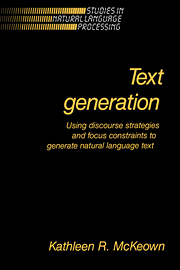Book contents
- Frontmatter
- Contents
- Preface
- 1 Introduction
- 2 Discourse Structure
- 3 Focusing in discourse
- 4 TEXT system implementation
- 5 Discourse history
- 6 Related generation research
- 7 Summary and conclusions
- Appendix A Sample output of the TEXT system
- Appendix B Introduction to Working
- Appendix C Resources used
- Appendix D Predicate Semantics
- Bibliography
- Index
3 - Focusing in discourse
Published online by Cambridge University Press: 23 December 2009
- Frontmatter
- Contents
- Preface
- 1 Introduction
- 2 Discourse Structure
- 3 Focusing in discourse
- 4 TEXT system implementation
- 5 Discourse history
- 6 Related generation research
- 7 Summary and conclusions
- Appendix A Sample output of the TEXT system
- Appendix B Introduction to Working
- Appendix C Resources used
- Appendix D Predicate Semantics
- Bibliography
- Index
Summary
Focusing is a prevalent phenomenon in all types of naturally occurring discourse. Everyone, consciously or unconsciously, centers their attention on various concepts or objects throughout the process of reading, writing, speaking, or listening. In all these modalities, the focusing phenomena occur at many levels of discourse. For example, we expect a book to concern itself with a single theme or subject; chapters are given headings, indicating that the material included within is related to the given heading; paragraphs are organized around topics; and sentences are related in some way to preceding and succeeding sentences. In conversation, comments such as “Stick to the subject …”, “Going back to what you were saying before ‥”, or “Let's change the subject …” all indicate that people are aware that the conversation centers on specific ideas and that there are conventions for changing the focus of attention.
The use of focusing makes for ease of processing on the part of participants in a conversation. When interpreting utterances, knowledge that the discourse is about a particular topic eliminates certain possible interpretations from consideration. Grosz (77) discusses this in light of the interpretation of definite referring expressions. She notes that although a word may have multiple meanings, its use in an appropriate context will rarely bring to mind any meaning but the relevant one. Focusing also facilitates the interpretation of anaphoric, and in particular, pronominal, references (see Sidner 79). When the coherence provided by focusing is missing from discourse, readers and hearers may have difficulty in determining what a pronoun refers to. When speaking or writing, the process of focusing constrains the set of possibilities for what to say next.
- Type
- Chapter
- Information
- Text Generation , pp. 55 - 82Publisher: Cambridge University PressPrint publication year: 1985

